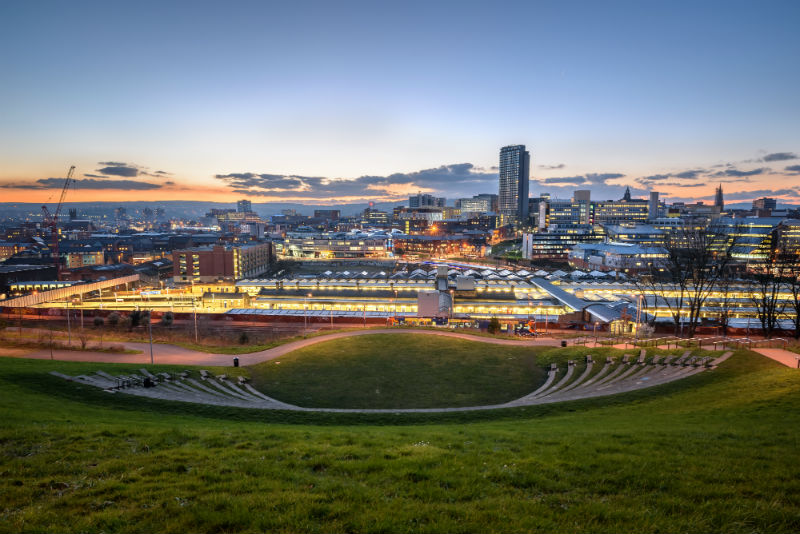Why Should You Invest in Sheffield Property?

At first glance Sheffield is a fairly innocuous city, and perhaps doesn’t have the glamour of some other northern cities like Leeds or Manchester. However, a population of 518,090 places it 6th in the UK (measured by Primary Urban Area), and an economic output of £31 billion per year makes it an important part of northern England’s output. In this article we’re going to take a closer look at what draws investors to this unique city.
A Thriving Population, and a Focus on Students
While you may not be looking to invest in student housing, the fact that Sheffield is home to two of the country’s largest universities (Sheffield University and Sheffield Hallam University) is part of its draw. There is constant demand for student accommodation, but also a constant stream of young graduates making their way in the city – 70,000 per year to be precise. This leads to a huge demand for private residential rental property, both in the city centre and in the suburbs.
Even if you’re not investing in student property, the high number of students may well benefit you as 25% of students choose to remain in the city following their studies.
Aside from students, the Sheffield Economic Plan is aiming to grow the population by 70,000 between 2015 and 2025. That’s a huge number of people to house, and a sure point to catch the attention of investors looking at Sheffield’s investment potential.
Transport Links In Sheffield
There is far more to the property investment opportunities than students and graduates, however. The borough of Sheffield (that’s the Urban area plus it’s surrounding districts) is the third largest in the England, and as it’s relatively centrally located in the country, it’s naturally ideal in terms of travel and accessibility.
The city has four airports within less than half an hour’s drive, helping to make it an easy transport hub for overseas as well. Laying adjacent to the M1, Sheffield is also directly linked to many cities and towns all over the UK, especially thanks to speedy direct train links to London.
Big news for the city is the plan to have a Sheffield stop on the new High Speed Rail 2 line. This will create more services and reduce times when travelling to London and the South. Added to that, HS2 is expected to combine with the Northern Powerhouse Rail project – meaning that not only will travel from the southern regions to Sheffield be easier but huge swaths of Northern England will be better connected. Leeds and Manchester, for example, will be within 30 minutes travel time from Sheffield.
Buy-to-let Property In Sheffield
Regeneration and a buoyant job market combine to make Sheffield a very popular place for people to live, work and study. The corresponding demand for homes, rental property, retail space and commercial units is increasing faster than it can be provided.
All of which leaves a very attractive area for investment, particularly with buy-to-let property. We can attribute the resilience of the private rental market in Sheffield to the limited number of high-quality housing schemes that are available in central locations, particularly when compared to other cities.
Since 2016, house prices in Sheffield have risen 11% according to Zoopla, that’s the 6th highest in the country and 10% more than London.
Robust Economy In Sheffield
Sheffield’s fast-growing economy is now worth £7bn a year. Its GVA (Gross Value Added) performance has increased by almost £4 billion since 1997, and the economy is continuing to grow by an average of 5% every year.
Investment in the city is helping Sheffield to remain of England’s leading areas for manufacture and engineering. In recent years, there has also been a significant growth in the service industries, as well as financial services, digital and new media, environmental technology and energy. An international reputation as a centre for excellence and cutting-edge delivery is being enhanced all the time.
With branches of some of the world’s most famous organisations located in the city (IBM, Rolls Royce and Boeing etc), Sheffield is well placed to attract international interest due to its accessible location, key industrial sites and large retail outlets including Meadow Hall, the largest shopping centre in Yorkshire.
The Sheffield City Region team is redeveloping the area’s economic strategy, which will be a route-map for the South Yorkshire economy. The strategy will also form the basis for Government investment over the short, medium and long term.
Here’s a quick breakdown of the main goals of the strategy:
Sheffield Strategic Economic Plan 2015-2025
- 70,000 more jobs
- 6,000 more businesses
- £3billion increase in GVA
- 30,000 highly skilled occupations
Another interesting factor to note is that in the three months leading up to June 2019, Sheffield’s wages have increased 3.9%, thats a greater increase than any year since 2008. Also, the buoyancy of the local economy is represented by the fact that Sheffield’s unemployment rate has halved since 2014. The employment rate is actually the second strongest in the UK.

Sheffield – A worthwhile proposition for investors
Massive Regeneration Projects
We’ve already seen the extent to which Sheffield is expected to expand. Expansion comes hand in hand with regeneration, in this case aimed at developing new high specification residential areas and the city centre area for commerce and entertainment. Regeneration-focused areas are dotted in and around the city. For example, the Heart of the City Project 2 is a £550 million planned investment in the city centre to meet the 21st century demand of small and large retailers. It’s a slightly too broad a task to go into details on every regeneration project here, but areas of focus are West Bar Square, Castlegate, Kelham Island, and the Cultural Industries Quarter.
The Outdoor City
One of Sheffield’s most important USPs is its commitment to the natural environment. In fact, Sheffield is widely recognised as one of the UK’s greenest cities and is the only major city to have a National Park within its boundary, as well as two million trees, 83 parks and 150 woodland areas. The city was voted the‘best city to live in for countryside lovers’ by BBC Countryfile in 2014.
Sheffield is so committed to its natural elements that it has developed its own economic strategy to grow the ‘The Outdoor City’ brand, by investing in places that appeal and attract people while supporting infrastructure that enables residents, businesses and visitors to have easy access to high quality outdoor recreation experiences. Sustainability and nature is becoming a fundamental value of life in the 21st century; a city like Sheffield which is determined to realise its full potential as a location for sport, nature, health and well-being can only seek to generate more interest among visitors and residents looking to relocate.
Expanding Cultural Reputation
Sheffield employs 7.2% of its working population in work that contributes to the city’s cultural output; that’s well above the national average of 4%. The Cultural Industries quarter is an area of the city centre dedicated to creating a hub of music, film and science based businesses. Kelham Island is Sheffield’s answer to the need for independent business and culture. Once an exclusively industrial area, the area is now home to all manner of cafes, gastro pubs, bars and breweries as well as outlets for vintage clothes and handmade trinkets, and various artist studios and museums.
What does all this mean?
We started off by saying how Sheffield is a fairly unassuming city in among the northern cities. Hopefully it’s clear from this that the city has big plans to bring itself in line with the broader Northern Powerhouse project.


